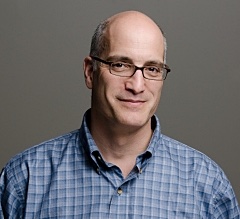6-Month Data from Parkinson’s mPower App Study in 9,500 People Released to Researchers

 An unparalleled dataset capturing the everyday experiences of the more than 9,500 people enrolled in the mPower mobile research study of Parkinson’s disease was released this month, and made available to the Parkinson’s research community worldwide. The ongoing study, which aims to help speed scientific progress toward treatments, is enabled by an iPhone app developed by Sage Bionetworks, a nonprofit research organization, in collaboration with researchers at the University of Rochester.
An unparalleled dataset capturing the everyday experiences of the more than 9,500 people enrolled in the mPower mobile research study of Parkinson’s disease was released this month, and made available to the Parkinson’s research community worldwide. The ongoing study, which aims to help speed scientific progress toward treatments, is enabled by an iPhone app developed by Sage Bionetworks, a nonprofit research organization, in collaboration with researchers at the University of Rochester.
The findings consist of millions of data points collected on a nearly continuous basis through the iPhone app mPower, and offer insights that can only be realized with a large, open community of data that scientists might analyze and re-analyze to advance research and potential treatments.
The Parkinson mPower app, one of Sage Bionetworks’ signature apps that launched with Apple Inc.’s latest-generation ResearchKit in March 2015, is being used as the data collection medium for the mPower study, which is still recruiting participants. The app uses questionnaires and leverages sensor data from an iPhone and an optional wearable device 24/7, to continuously gather data on how a user’s capacities are affected by Parkinson’s disease, including dexterity, balance and gait, memory, and certain voice characteristics.
Patients agreeing to join the study are sent a copy of their signed consent form by email. The app will read and/or write data from Apple’s Health App with participants’ permission. (Of note, continued use of GPS running in the background can dramatically decrease iPhone’s battery life.) Details on eligibility for participation in the study is available at the end of this article.
Unlike traditional research studies, mPower participants are able to choose how they wish to share their data. Participants are given the option of sharing their data only with the mPower study team and its partners (‘share narrowly’), or sharing more broadly with qualified researchers worldwide. Sage Bionetworks reports that during the study’s first six months, over 75 percent of mPower participants chose to share their data broadly with qualified researchers. (Sage encourages members of the research community to learn more about accessing the data and becoming a qualified researcher by visiting the mPower Public Researcher Portal, where they will find FAQs for data users.)
 In a paper published in the journal Scientific Data, titled “The mPower study, Parkinson disease mobile data collected using ResearchKit” (Sci. Data 3:160011 doi: 10.1038/sdata.2016) and co-authored by Brian M. Bot, the researchers observe that current measures of health and disease are often “insensitive, episodic, and subjective.” Moreover, these measures are generally are not designed to provide meaningful feedback to individuals.
In a paper published in the journal Scientific Data, titled “The mPower study, Parkinson disease mobile data collected using ResearchKit” (Sci. Data 3:160011 doi: 10.1038/sdata.2016) and co-authored by Brian M. Bot, the researchers observe that current measures of health and disease are often “insensitive, episodic, and subjective.” Moreover, these measures are generally are not designed to provide meaningful feedback to individuals.
They also note that the impact of high-resolution activity data collected from mobile smartphones is only beginning to be explored. In their paper, they present data from the mPower observational study on Parkinson’s disease conducted purely through an iPhone app interface.
Because the ResearchKit app source code for these data collection modules are available through an open source license for use in studies of other conditions, the co-authors express hope that releasing data contributed by engaged research participants will encourage analysts to work collaboratively on understanding how mobile health data can be leveraged to advance human health.
An estimated 7 to 10 million people worldwide are living with Parkinson’s disease, a degenerative movement disorder related to the loss of mid-brain cells that produce the brain-regulating chemical dopamine, and manifests in symptoms that can cause tremors, speech and memory problems, changes in gait, slowness (bradykinesia), and rigidity. There is significant variability in the presentation and progression of these symptoms, and while there is no known cure for PD, treatments can mitigate symptoms’ effects.
The paper’s co-authors hypothesize that, as PD patients typically visit with a physician every four to six months, a better understanding of day-to-day variability in symptoms and a medication’s effects could open opportunities for interventions that might improve overall quality of life. They suggest that more frequent quantitative assessments could also lead to a better understanding of disease heterogeneity, and observe that mobile phones and other networked devices present investigators with a unique opportunity to engage research participants without requiring physical interaction — an approach that allows classic techniques, such as surveys, to be administered remotely. Moreover, mobile device sensors, such as accelerometers, gyroscopes, and microphones, can provide quantitative appraisals of PD symptoms with minimal or no interruption in the participant’s daily life.
 “An overwhelming number of mPower participants have chosen to donate their data to science. Now science must do its part. As researchers, we must step up to the plate to make sense of all this data and translate it into real change in the lives of people suffering with Parkinson’s,” says Stephen H. Friend, MD, PhD, president of Sage Bionetworks, in a release.
“An overwhelming number of mPower participants have chosen to donate their data to science. Now science must do its part. As researchers, we must step up to the plate to make sense of all this data and translate it into real change in the lives of people suffering with Parkinson’s,” says Stephen H. Friend, MD, PhD, president of Sage Bionetworks, in a release.
 In a commentary published this week in the journal Nature Biotechnology (Nature Biotechnology (2016) doi:10.1038/nbt.3516) Dr. Friend and John Wilbanks, Sage Bionetworks’ chief commons officer, write that the release of mPower comes at a turbulent time in data sharing. U.S. Vice President Joe Biden, who heads President Barack Obama’s ambitious “cancer moonshot” program, described data sharing as second only to funding for the program’s ultimate success, but such support for data sharing stands in opposition to the opinion of many within the research establishment. They cite a recent New England Journal of Medicine editorial suggesting that those who wish to reuse clinical trial data without direct participation and approval of the original study team are “research parasites.” The two men caution that, “in the wake of colliding perspectives on data sharing, we must not lose sight of the scientific and societal ends served by such efforts.”
In a commentary published this week in the journal Nature Biotechnology (Nature Biotechnology (2016) doi:10.1038/nbt.3516) Dr. Friend and John Wilbanks, Sage Bionetworks’ chief commons officer, write that the release of mPower comes at a turbulent time in data sharing. U.S. Vice President Joe Biden, who heads President Barack Obama’s ambitious “cancer moonshot” program, described data sharing as second only to funding for the program’s ultimate success, but such support for data sharing stands in opposition to the opinion of many within the research establishment. They cite a recent New England Journal of Medicine editorial suggesting that those who wish to reuse clinical trial data without direct participation and approval of the original study team are “research parasites.” The two men caution that, “in the wake of colliding perspectives on data sharing, we must not lose sight of the scientific and societal ends served by such efforts.”
They contend that mobile health data sharing has a powerful potential to accelerate discovery, and that “rapid sharing of data from a large-scale observational study, such as mPower, provides a mechanism to distribute the task of developing appropriate analytical methods and identifying the approaches that maximize the utility of this new type of data.”
By facilitating rapid and widespread distribution of mobile health data, they hope to entice a community of researchers to evaluate the applicability of a wide range of analytical approaches to derive meaning from this emerging type of data, and say that their experience with mPower suggests that participants who give their time and sensitive personal information to researchers often assume that data will be distributed to the full research community, and not be ‘owned’ as an asset solely by the researchers who collected it.
Mr. Wilbanks and Dr. Friend conclude: “It is precisely to enable a new class of medical researchers that we at Sage Bionetworks offer participants the choice as to whether or not to share their own study data. In our view, those who would reuse study data are more commonly known as data scientists than parasites, and their reanalysis is to be welcomed.”
“The breadth and richness of this data demand that it not be shut away,” Dr. Friend maintains. “By releasing this data widely, we hope to seed a community of researchers working collaboratively to unlock the knowledge within and make new insights that help us begin to fully understand the lived experience of someone with Parkinson’s.”
Margaret Anderson, executive director at Faster Cures, adds: “We have been watching the emergence of participant-centric research closely at FasterCures. Sage has placed research participants right in the middle of their studies, and given them the chance not just to be part of the research but to be in the driver’s seat.”
The dataset released on March 3 represents the first six months of data donated by mPower participants, and Sage intends to add new data from the mPower app on a regular basis.
 “This groundbreaking dataset is a wonderful example of how these new technologies and platforms can help us build a robust culture of health,” observes Paul Tarini, senior program officer at the Robert Wood Johnson Foundation. “They make it easier for more people and researchers to participate in efforts to understand diseases and how to manage them and, in turn, all of us benefit.”
“This groundbreaking dataset is a wonderful example of how these new technologies and platforms can help us build a robust culture of health,” observes Paul Tarini, senior program officer at the Robert Wood Johnson Foundation. “They make it easier for more people and researchers to participate in efforts to understand diseases and how to manage them and, in turn, all of us benefit.”
Researchers can become qualified and access the Parkinson’s database via Synapse, a data and analysis sharing platform.
Sage also plans to host a webinar on March 8 to showcase the mPower study data and guide researchers in accessing it. Anyone interested in the data or the upcoming webinar can find updates on the mPower Public Researcher Portal wiki.
Key Features of the Parkinson mPower app are:
• Activity-based measurements of Parkinson symptoms, including a memory game, finger tapping, voice recording, and walking.
• Information about symptom variations
• Importing of daily physical activity measures though Apple Health app
Eligibility
To join the mPower mobile research study, you need to:
• Be age 18 or older
• Have Parkinson disease or not (serve a control)
• Be a U.S. resident
• Have a personal iPhone (iPhone 4S or newer). The app requires iOS 8.0 or later, and is compatible with iPhone and iPod touch.
The free app is available for download at: itunes.apple.com/us/app/parkinson-mpower-study-app/id972191200?mt=8
Sources:
Sage Bionetworks
mPower
Scientific Data
Nature Biotechnology
Apple Inc.
ResearchKit
Robert Wood Johnson Foundation







